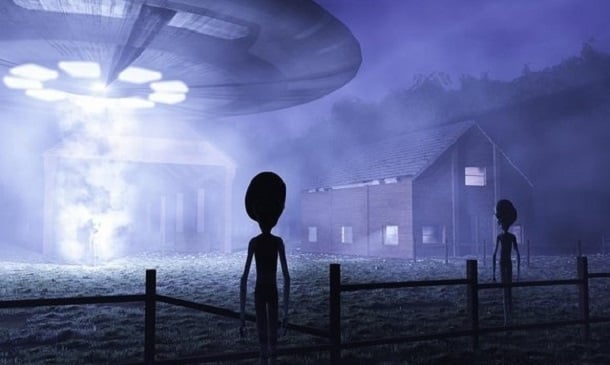Consider this: There are billions of stars in our galaxy and a large percentage of them have planets orbiting. There is an incredibly high probability many of those planets are in the “habitable zone” – an area not too close and not too far from the star to foster earth-like life. The single such planet we have collected data on is our own and, it turns out, this planet allowed for us to evolve into a space-faring species. Given all this, one would expect a large number of space-faring species in our galaxy, many of which should be much further along than us considering the more advanced ages of their stars and satellites. This begs the question, where are they?
Physicist Enrico Fermi asked this and now the surprising lack of aliens given the apparent probability of aliens is called the Fermi Paradox. Let’s go over the best reasons we are still alone in the universe, from least convincing to most convincing.
10. Aliens never existed.
The most straightforward reason for not seeing aliens is that there are no aliens. Earth could be unique in the universe as the only environment that has fostered intelligent life. Considering we tend to be wrong whenever we consider ourselves special, it’s a long shot.
9. Aliens are scared of us.
Humans have a history of violence and any alien life would have seen our history through their telescope equivalents before engaging in long distance tourism. It could be a deterrent. Still, scared of us? I think it’s unlikely if they get to us before we can get to them. There is a chance earthy viruses or bacteria could negatively affect their biology, but I imagine they’d do the research before putting stuff in their mouth (if they have a mouth.)
8. We aren’t paying attention.
We have SETI, sure, but let’s face it…we could try harder. Perhaps YouTube is distracting us from joining an interplanetary society.
7. Aliens are dead.
What if at some point in the development of intelligent forms of life there is some obstacle that derails further advancement? It could be war, scarcity, or an unintended consequence of civilization (global warming, maybe) that does these cultures in. Whatever it is, it happens to most evolved life. This has been called the “great filter” hypothesis because this obstacle (or set of obstacles) filters out a possibly large number of alien life forms to a very small set. These survivors, if there are any, are so rare that the probability of discovery is next to nothing. The scary thing is, if true, such an obstacle is almost certainly in humanity’s future as well.
6. We’re not worth it.
Aliens could be exploring the cosmos extensively, discovered us already, and moved on. Hollywood suggests advanced life would need our resources, but realistically why would they? The resources needed to reach Earth almost certainly outweigh the resources Earth can uniquely provide. It would make more sense to mine the closest asteroid. The most interesting thing on our planet, to us, are fellow humans, but “interest” is subjective. Extraterrestrials may not care. I think of the much-hyped video game ‘No Man’s Sky’ and how people are already bored visiting planets teeming with life. The simplicity of artificial intelligence is not enough to keep gamers’ attention. We might be too simple too.
5. Space isn’t worth it.
I don’t want to trigger an existential crisis, but it’s possible that when sentient life reaches a certain level of intelligence, they could be too contemplative to explore anything outside themselves. I’m not even sure if I mean that figuratively or literally. They could seek a more meaningful purpose or a more prefect happiness; or they may turn their science inward and find the complexity of their own atoms and their immediate surroundings could have more value than the beyond. One could argue that we are already heading that direction since we have spent more resources learning about particle physics and taking selfies than a manned mission to Mars.
4. We don’t recognize each other.
Hollywood depicts aliens as human-like or, when they want something a little more scary, insect-like, but that’s a big assumption based on little more than our earthly experience. They could look, smell, and taste like anything. All known life is based on the element of carbon so it’s reasonable to expect extra terrestrials will be likewise carbon-based, but science shows that needn’t be the case. Different animals sense the world entirely different from humans making any shared experience impossible. Hell, some humans sense the world different than other humans. This subjective divide means that aliens could be so, well, alien that we wouldn’t know them if we were right on top of them. And they, perhaps, wouldn’t know us.
3. Space is big.
If life is sufficiently rare in the universe space may be too damn big for mutual discovery. A thriving civilization could be the needle in a haystack of dead worlds. How are we supposed to find them? We can look deep into the cosmos with powerful telescopes, but knowing where to look isn’t always a question we can answer.
2. We can’t get there.
This (or #1) is perhaps the most reasonable explanation for the lack of E.T.. Ours is the only planet in our solar system that has visible signs of life. This means that the closest planet that could host spacefaring creatures must orbit Proxima Centauri. That’s over four light years away. A light year is the distance light travels in a year, so a light-speed space craft would take over four years to travel the distance. Four years ain’t bad, but light-speed travel seems to be impossible. The energy needed to get a craft to that speed approaches the net energy of the universe itself because the craft would approach infinite mass as it gets closer to light-speed. We can’t realistically consider getting to the star closest to the sun in under 1000 years. This means whoever we send on that craft would be generations deep before arrival. We could deep freeze the passengers or send robots, but those options mean that any knowledge from the exploration wouldn’t be made available to humanity as a whole until long after the initiating generation is dead. This puts a damper on our motivation.
1. Aliens can’t get here.
See above with a couple wrinkles. Let’s assume that somewhere in the universe an alien species has a much better mode of space travel than us. Even so, it probably isn’t faster than light. All evidence points to light-speed as the speed limit of the universe. To get close to that speed the aliens would have to be super advanced. They might exist somewhere, but what are the odds they exist around a neighboring star. Instead of Proxima Centauri, they might live 1000 light years away. Even with their speedy tech, they almost certainly face the same barrier we do in reaching nearby stars today-a lifespan shorter than their travel time. This doesn’t make a multi-generation endeavor impossible, but it would require a level of patience as evolved as their propulsion system.


